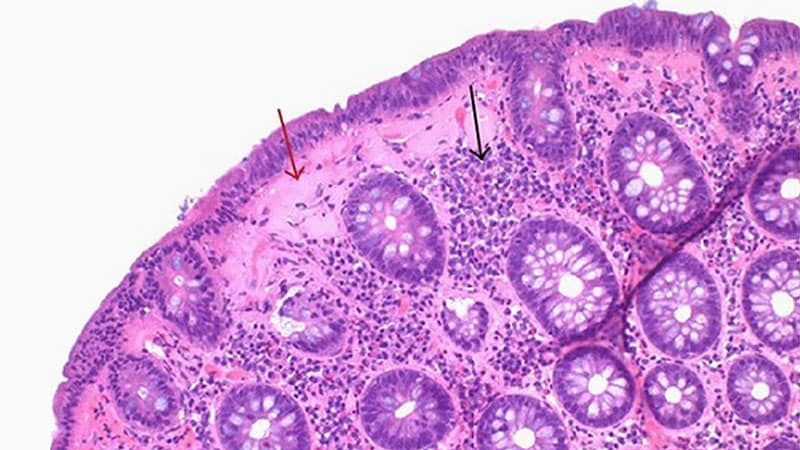核心概念
Microscopic colitis studies reveal insights on acute pancreatitis, cardiovascular disease, dietary factors, and treatments.
摘要
Microscopic colitis (MC) encompasses lymphocytic colitis and collagenous colitis, leading to chronic diarrhea, abdominal pain, and more. Recent studies shed light on MC's association with acute pancreatitis, cardiovascular events, dietary calcium intake, and treatment options like bile acid sequestrants. These findings provide valuable insights for patient management.
New Data Linking MC With Acute Pancreatitis
- Patients with MC have an increased risk of acute pancreatitis.
- Budesonide use is associated with a higher risk of acute pancreatitis.
- Clinicians should be vigilant in evaluating MC patients for acute pancreatitis.
Bile Acid Sequestrants: Investigating a New Treatment Option
- Bile acid sequestrants show varying response rates in MC patients.
- BASs should be considered as a first-line treatment for MC.
- Fecal bile acid testing did not correlate with response to BAS treatment.
The Possible Impact of Dietary Calcium on MC
- Dietary calcium intake may influence the prevalence of MC.
- Increased dietary calcium intake is associated with specific gut microbiome changes.
- Dietary calcium may play a role in the pathogenesis of MC.
Uncovering an Elevated Risk for Major Cardiovascular Events
- Patients with MC have an increased risk of major adverse cardiovascular events.
- MC patients are at higher risk for ischemic heart disease, congestive heart failure, and stroke.
- Awareness of cardiovascular risk factors is crucial in managing MC patients.
客製化摘要
使用 AI 重寫
產生引用格式
翻譯原文
翻譯成其他語言
產生心智圖
從原文內容
前往原文
www.medscape.com
4 New Studies Shed Light on Microscopic Colitis
統計資料
MC patients had a 1.6-times increased risk for acute pancreatitis.
The adjusted hazard ratio for acute pancreatitis was higher in the first year of MC diagnosis.
Patients with MC had an increased risk of major adverse cardiovascular events.
The increased risk for an incident MACE in patients with MC was 27% higher than in control individuals.
引述
"Clinicians should have a low threshold when evaluating for acute pancreatitis in patients with MC."
"Bile acid sequestrants should be considered as a first-line treatment for all MC patients."
"Increased dietary calcium intake had significant associations with the abundance of specific gut microbiome phyla."
從以下內容提煉的關鍵洞見
by David A. Joh... 於 www.medscape.com 07-18-2023
https://www.medscape.com/viewarticle/994334
深入探究
How can the findings on dietary calcium intake in MC patients impact treatment strategies?
The study highlighting the association between dietary calcium intake and MC prevalence suggests a potential avenue for treatment strategies. Patients with the highest reported quartile of dietary calcium intake showed a significant risk reduction for MC. This finding could lead to dietary recommendations as part of the treatment plan for MC patients. Increasing dietary calcium intake may help in managing the disease by influencing the intestinal biome, as indicated by the microbiome analysis in the study. Further research could explore the possibility of using supplemental calcium or modifying dietary calcium amounts as a targeted approach in the treatment of MC.
What are the potential implications of the increased cardiovascular risk in patients with MC?
The data revealing an elevated risk for major adverse cardiovascular events (MACEs) in patients with MC have significant implications for clinical management. Patients with MC had a higher incidence of MACEs, including ischemic heart disease, congestive heart failure, and stroke. This increased cardiovascular risk underscores the importance of monitoring and addressing cardiovascular health in MC patients. Healthcare providers should be vigilant in assessing and managing cardiovascular risk factors in these patients. Strategies to mitigate cardiovascular risks, such as lifestyle modifications, regular monitoring, and potential pharmacological interventions, should be integrated into the comprehensive care of individuals with MC.
How might the use of bile acid sequestrants influence the management of other gastrointestinal conditions?
The study evaluating the effectiveness of bile acid sequestrants (BASs) in MC patients sheds light on the potential impact of these medications on the management of other gastrointestinal conditions. BASs were found to be effective in treating MC, with significant response rates observed in patients. This suggests that BASs could be considered as a viable treatment option not only for MC but also for other gastrointestinal conditions that share similar pathophysiological mechanisms. The findings indicate that BASs could serve as a first-line treatment for patients with MC, including those who are unresponsive to other medications. Healthcare providers may explore the use of BASs in the management of other gastrointestinal disorders to improve patient outcomes and potentially avoid the need for more aggressive therapies.
0
